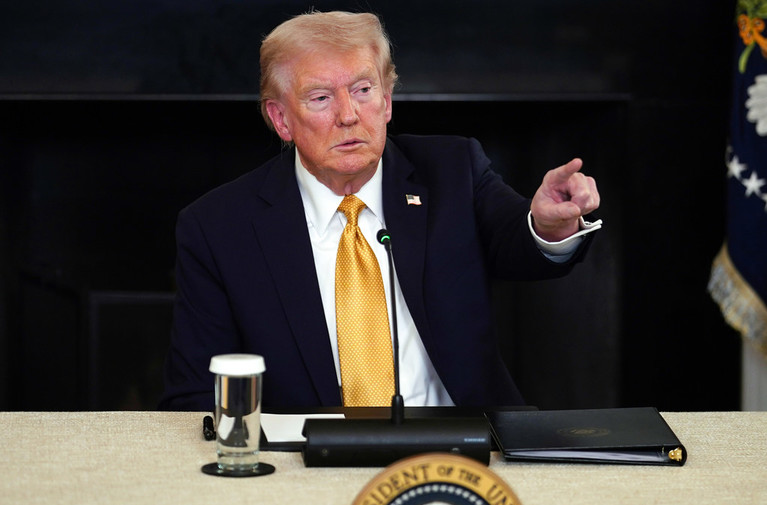By Sam Michael
Elite law firms entangled in President Trump’s aggressive push against Big Law are staring down a surprising reality: their massive pro bono commitments could wrap up in months, not years. Yet with internal pushback mounting and vague terms clouding the path, the question lingers—will they actually deliver on these $940 million pledges amid escalating geopolitical risk in the legal sector?
The saga began in early 2025 when Trump unleashed a barrage of executive orders targeting firms accused of ties to his critics or “illegal” diversity practices. These moves threatened security clearances, federal contracts, and access to government buildings, prompting swift capitulation from nine powerhouse firms. Paul, Weiss kicked things off in March with a $40 million pledge, followed by Skadden, Arps; Willkie Farr & Gallagher; and Milbank each committing $100 million. By April, Kirkland & Ellis, Latham & Watkins, Allen Overy Shearman Sterling, Simpson Thacher & Bartlett, and Cadwalader, Wickersham & Taft joined in, each ponying up $125 million or $100 million, totaling nearly $1 billion in free legal services for causes like aiding veterans, combating antisemitism, supporting law enforcement, and ensuring “fairness” in the justice system.
A fresh Law.com analysis reveals the eye-popping potential speed of fulfillment. Five of these firms—Latham & Watkins, Kirkland & Ellis, Simpson Thacher & Bartlett, Allen Overy Shearman Sterling, and Willkie Farr—boast such robust pro bono programs that redirecting last year’s hours and rates could clear their obligations in under 12 months. Latham, for instance, logged over 193,000 pro bono hours in 2024 at an average $1,500 per hour, enough to hit its $125 million target in about six months. Kirkland’s 2024 output topped 250,000 hours, positioning it for completion by mid-2026 if fully allocated. These aren’t small outfits; they’re Am Law 100 giants with global footprints, where pro bono often exceeds 3% of billable time.
Background underscores the high-stakes origins. Trump’s orders, starting with Paul, Weiss over its role in his hush-money prosecution, escalated to probes by the EEOC on DEI policies. Firms settled to dodge crippling fallout, agreeing not just to pro bono but to merit-based hiring and non-discrimination in client representation. Trump touted the deals as victories against the “weaponization” of law, even floating uses like tariff negotiations or coal lease revivals—ideas that stretch traditional pro bono beyond indigent aid. Internal memos from settlers like Kirkland emphasized retaining control over case selection, framing pledges as extensions of existing non-partisan work.
Public reactions split sharply along ideological lines. On X, legal insiders buzzed with skepticism; one viral post from a junior associate at a settling firm griped, “Pro bono for coal miners? That’s not public good—that’s political payback.” Conservative voices cheered, with Trump allies like Newsmax’s Greta Van Susteren pushing veteran cases through firm channels. The American Bar Association slammed the deals as “chilling” to free speech, warning of a distorted pro bono landscape where firms shy from anti-administration cases. Experts like Veta T. Richardson of the Association of Corporate Counsel called it a “transformative moment,” urging transparency to prevent repurposing routine projects as “new” fulfillments.
For U.S. readers, the stakes ripple through economy, politics, and daily life. Economically, these pledges could inject vital support into underserved areas—veterans’ claims in states like Texas or antisemitism suits in New York—bolstering small businesses and nonprofits hit by federal cuts. Politically, they fuel debates on executive overreach, with Democrats like Rep. Jamie Raskin demanding deal details and lawsuits piling up against holdouts like Perkins Coie. Technologically and in lifestyle terms, freer legal aid might ease burdens on first responders in tech hubs like Silicon Valley, where firms like Latham operate, but only if work flows to community needs over White House whims. Nonprofits report a chilling effect, hiring in-house to replace lost firm support, potentially hiking costs for everyday Americans seeking justice.
Yet hurdles abound. Junior lawyers at Kirkland have openly rebelled, vowing to skip Trump-aligned matters, while firms retrofit existing hours—say, ongoing veteran clinics—to count toward pledges, diluting impact. Watchdogs like the Oversight Project plan “compliance grades,” threatening scrutiny if uptake lags. As of late October 2025, only spotty progress shows: two firms aiding Commerce Department trade talks, but broader rollout stalls amid vague tracking.
This pro bono standoff highlights deeper tensions in Trump’s second term, where law firms balance survival with ethics. With Trump deal firms, pro bono pledges, Trump law firm deals, and Big Law pro bono now trending in legal circles, the coming months will test if these giants prioritize speed or scrutiny. Rapid fulfillment could quiet critics and unlock real aid, but delays risk eroding trust in an already polarized profession. As oversight intensifies, the legal world watches warily for accountability.
Follow and subscribe to us for the latest on Trump law firm deals and Big Law pro bono—enable push notifications to stay ahead of the curve.
Trump pro bono pledges, law firm Trump deals, Big Law commitments, pro bono fulfillment, Trump administration law firms, elite law firms pro bono, Trump executive orders, legal pro bono services, Big Law politics, pro bono veterans aid
